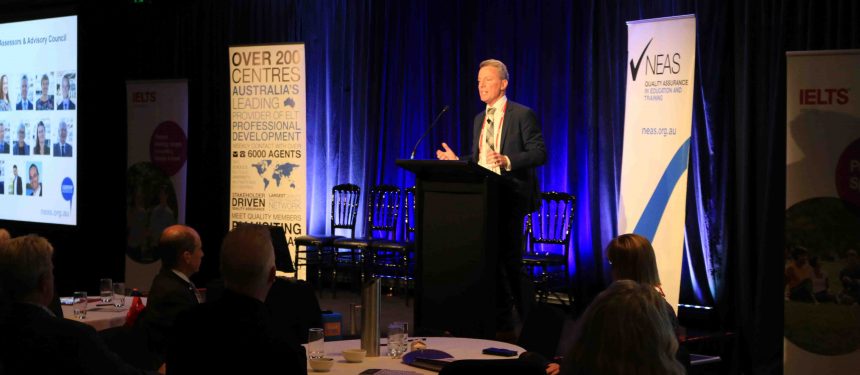Australia’s English language sector is in an advantageous position to expand its reach into the ASEAN region and help its countries develop their own sectors and quality assurance models, according to speakers at this year’s NEAS Management Conference in Sydney.
News and business analysis for Professionals in International Education
Have some pie!
Australia: NEAS increases focus on ASEAN region at conference
 Australia has a substantial role to play in developing ASEAN ELT. Photo: The PIE
Australia has a substantial role to play in developing ASEAN ELT. Photo: The PIE Themed Leadership in ASEAN and Australia, the quality assurance agency’s 2019 conference brought together partner institutions from around the region to discuss broader partnership opportunities.
“Indonesia’s changing very rapidly”
“We thought this was a really good context to start looking at what are the similarities and the differences [between Australia and ASEAN],” said NEAS chief executive Patrick Pheasant.
“We’ve found there are a lot of similarities, but when we look at in-context, the centres that we endorse in South East Asia, we’ve got to take onboard the local regulations, the local situation.”
Speaking with The PIE News, Pheasant said the decision to focus on ASEAN, whose member countries include Indonesia, Malaysia, the Philippines, Singapore, and Thailand, came after NEAS workshops identified a growing desire by Australian providers to engage in the region.
“We’re trying to create a space where there can be transnational education, there can be articulations and agreements and partners in the growing English language countries in South East Asia,” he said.
Australian providers are also increasingly looking outwards as part of their growth targets, Pheasant continued, which would help to overcome individual market requirements and changes.
“I think Australia’s NEAS endorsed centres are certainly looking for ways to mitigate those changes in market by having long term pathways in place,” he said.
According to Denise Finney, chief executive of IALF Indonesia, many countries within South East Asia are expanding their education offerings for both international and domestic students.
“Indonesia’s changing and changing very rapidly. Asia, in general – the speed of change I just don’t think you can imagine how quickly things move,” she told delegates at a panel on ASEAN influencers.
“There’s an acknowledgement that we’re all working together”
“It’s the same with their education systems. Things are changing very rapidly, but some things still remain very challenging.”
Among the challenges that Australian providers could help to address, Finney observed the difference between learning styles, with many ASEAN countries focusing on rote learning.
A lack of formal accrediting and regulatory bodies throughout the region for ELT is also a potential area for Australian providers, said executive director of ELS Malaysia Sean Chee.
“In Malaysia itself, we don’t have an accrediting body for ELT,” he said. “We have a very good accrediting bodies for higher education, called the Malaysian Qualifications Agency,” he continued, adding that MQA at this time did not provide regulatory functions for ELT.
Chee, whose language provider recently became the first Malaysia institution to receive NEAS endorsement, said a growing recognition of Australia’s high quality in the ELT space was driving up interest from within the ASEAN region.
NEAS has been increasingly moving its focus outside of traditional providers and Australia’s border. The first non-Australia ELT provider to receive quality assurance from NEAS was in 2006.
NEAS general manager Ana Bratkovic explained that by looking outside of Australia, the organisation was both helping to play a part in the broader region’s development, as well as assisting members to make meaningful connections.
“We do come across some misunderstandings from our providers onshore who are wondering why are we seeking to go offshore,” she said.
“It’s not that simple. We’re not necessarily looking to leave Australia; there’s an acknowledgement that we’re all working together, and this is an opportunity for us to talk about how out offshore providers are still closely aligned and involved in the experiences of students.”
Primarily focused on the English language, this year’s NEAS conference also included sessions around Indigenous language and sign language.
Still looking? Find by category:


